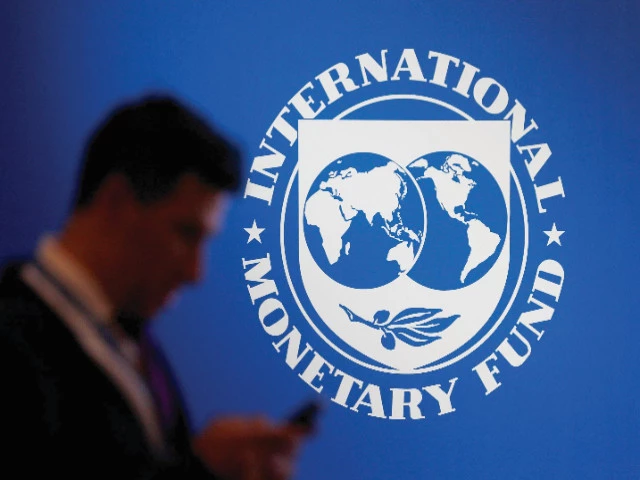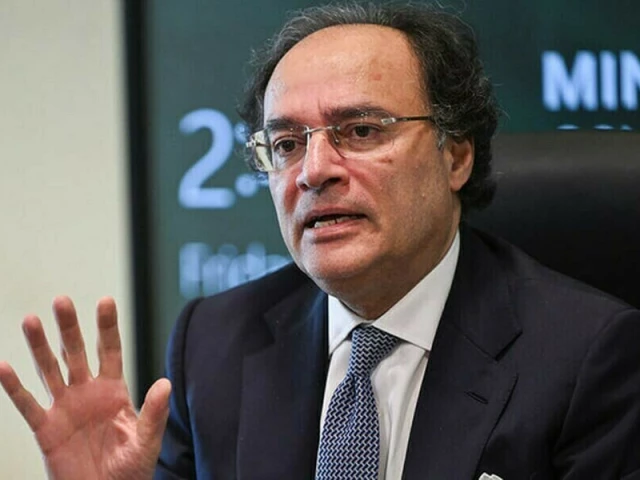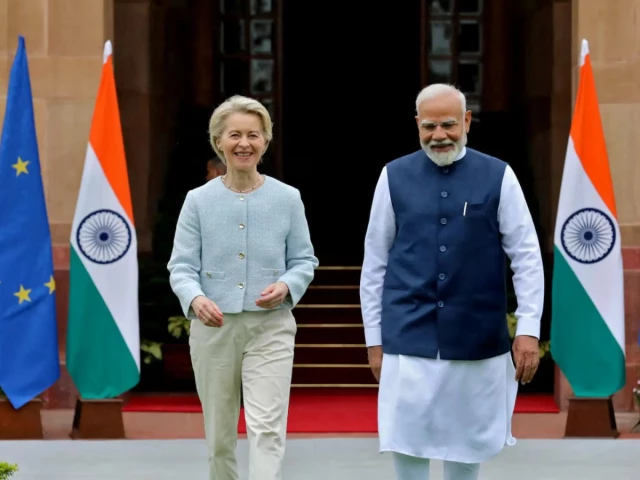Business
Inflation climbs to 6.2% as core prices rise, signalling renewed pressure on economy | The Express Tribune

Non-food, non-energy inflation accelerates; border closure sends tomato prices up 127% and sugar 35%, while gas jumps
ISLAMABAD:
Inflation rose for the second consecutive month to 6.2% last month due to movement in prices across various groups, with a notable increase in non-food and non-energy goods’ rates, indicating a buildup of underlying inflationary pressure.
The Pakistan Bureau of Statistics (PBS) reported on Monday that the key inflation benchmark increased by 6.2% on a year-on-year basis in October. The surge was in line with the government and market expectations. The government has attributed the increase to supply shocks caused by floods and the Pak-Afghan border closure. It was the second consecutive month when the price level increased in the country compared to a year ago. In urban areas, inflation increased by 6% on a year-on-year basis, while there was a surge of 6.6% in rural areas and towns. Inflation is again becoming a headline concern after prices started increasing for the past couple of months.
However, core inflation, which is calculated after excluding food and energy items to observe underlying pressures, also jumped. The core indicator suggests whether the rise is temporary or reflects longer trends.
The PBS reported that, measured by non-food and non-energy items, core inflation increased by 7.5% in urban areas compared to 7% of the previous month. Likewise, core inflation in rural areas also increased to 8.4% compared to 7.8% in the previous month. This suggests that the current trend may continue for a few months. Last month, the World Bank upwardly adjusted its inflation forecast for Pakistan to 7.2% for this fiscal year, which is slightly above the target.
The central bank had earlier said that inflation would temporarily increase this year because of floods and would start slowing during the later part of the second half of the fiscal year. The central bank had kept the interest rate unchanged at 11%, which is far higher than the headline inflation rate.
While addressing a press conference, Finance Minister Muhammad Aurangzeb said that interest rates were falling in the right direction but again hoped for a further cut in the rate.
Last month, the business community complained to the prime minister about high interest rates despite there being significant scope for reduction.
The government has kept Rs8.2 trillion for interest expense in the budget, but Secretary Finance, Imdad Ullah Bosal, said that actual spending would remain below the allocation due to better debt management.
The central bank is maintaining interest rates far above prevailing inflation levels, even as it projects that the economic growth target of 4.2% will again be missed this fiscal year.
The data showed that food price inflation accelerated to 4.5% in cities and 6.8% in rural areas, due to an increase in perishable and non-perishable food items.
According to the details, among non-perishable foods, which make up nearly 30% of the inflation basket, prices rose by 6.2% on average last month compared to a year earlier. In contrast, perishable goods recorded a 1.7% increase.
Due to border closures with Afghanistan, tomato prices increased 127%, followed by a 35% increase in sugar prices. The government has failed to deliver on its promise of ensuring the provision of sugar at less than Rs165 per kilogram. Wheat rates also surged by one-fourth, followed by a 16% increase in the rates of wheat flour. However, onion rates decreased by one-third, followed by a 29% reduction in chicken prices. There was also an administrative increase of 23% in the rates of gas last month compared to a year ago. But electricity charges were 16% lower than a year ago.
The Minister for Power, Sardar Awais Leghari, said on Monday that electricity prices were Rs10.3 per unit lower than a year ago due to renegotiations of energy agreements and reducing losses and inefficiencies.
Business
India-US trade deal: Hope and uncertainty as Trump cuts tariffs

Indian industry has welcomed lower tariffs, but experts caution against celebration until details are clearer.
Source link
Business
MCX Silver Jumps 6% To Hit Upper Circuit After 46% Crash; Can India–US Deal Spark A Sustained Rally?

Last Updated:
Silver prices staged a sharp rebound on Tuesday after an intense phase of liquidation that followed the abrupt unwinding of a record-setting rally

Silver Rates Surge Today
Silver Rates Today: Silver prices staged a sharp rebound on Tuesday after an intense phase of liquidation that followed the abrupt unwinding of a record-setting rally. The earlier sell-off had pulled prices down more than 46% from their peak in just three sessions, highlighting the extreme volatility in the precious metals space. Gold prices also recovered alongside silver.
On the MCX, silver hit the 6% upper circuit at Rs 2,50,436 per kg on February 3, while MCX gold climbed 3% to Rs 1,48,310 per 10 grams.
A key macro catalyst emerged after US President Donald Trump announced a trade agreement with India. The deal lowers US tariffs on Indian goods to 18% from 50% in exchange for India halting Russian oil purchases and easing certain trade barriers. The development added a fresh geopolitical layer to already jittery commodity markets.
Gold mirrored silver’s recovery in global trade. Spot gold rose as much as 4.2% to move above $4,855 an ounce after sliding 4.8% in the previous session. That decline had extended Friday’s slump, the steepest in over a decade.
Earlier, on January 30, spot gold had tumbled nearly 10% in its sharpest single-day fall since 1983, dragging prices back below the $5,000-an-ounce mark that had been crossed only days before and erasing a sizable portion of the year’s gains.
The rebound extended beyond gold and silver. Spot platinum advanced 3% to $2,183.64 an ounce after touching a record $2,918.80 on January 26, while palladium rose 2.7% to $1,765.75, joining the broader recovery across precious metals.
What drove the rebound after the crash?
Domestic sentiment got a lift from the India–US trade deal, while investors also reassessed geopolitical risks, currency movements and the outlook for US monetary leadership. Strong buying from Chinese retail investors ahead of the Lunar New Year further supported demand, although China’s markets are set to shut for over a week from February 16, temporarily sidelining a key source of consumption.
Traders are also watching developments involving Iran after Trump signalled that talks on a potential new nuclear agreement could begin soon. Any diplomatic progress could reduce gold’s safe-haven appeal and cap gains.
The earlier sell-off in bullion was initially triggered by Trump’s nomination of Kevin Warsh as the next Federal Reserve chair, which strengthened the US dollar and pressured metals. The slide intensified after CME Group raised margin requirements for precious metals futures, forcing leveraged traders to unwind positions quickly. A stronger dollar combined with higher trading costs led to a sharp liquidity squeeze, accelerating the fall.
Will the rally sustain?
Hareesh V, Head of Commodity Research at Geojit Investments, said longer-term drivers such as geopolitical tensions, central bank buying and macro uncertainty remain supportive for precious metals.
He noted that the previous correction was magnified by extremely overbought conditions after gold and silver had surged to record highs, with silver rallying more than 60% in a month and gold over 20%. Profit-booking snowballed into panic selling as liquidity thinned and volatility spiked.
“The violent drop was more of a technical correction than a deterioration in core fundamentals,” he said, suggesting that the broader structural support for the metals remains intact.
February 03, 2026, 11:07 IST
Read More
Business
Why Are Gold Prices Swinging? Nirmala Sitharaman Breaks It Down

Gold prices are no longer being watched only at home but across global markets, as sudden and unexpected swings keep investors on edge. Addressing the volatility, Finance Minister Nirmala Sitharaman stated that a deepening uncertainty in international markets is driving the fluctuations. Speaking to reporters on Monday, she pointed to rising anxiety among investors in global commodity trade, explaining that unstable conditions worldwide have eroded confidence in individual currencies. As a result, many investors are turning to gold as a haven, a shift she said is naturally fuelling the sharp ups and downs in gold prices.

According to data from the Multi-Commodity Exchange (MCX), gold prices slipped slightly on Monday evening. Compared to the previous session’s closing rate, the price of ten grams of gold declined by around Rs 280, marking a fall of less than 1%. Market experts note that daily price movements are largely driven by international trends. Due to this volatility, many buyers are adopting a wait-and-watch approach.

Over the past five days, gold prices in India’s spot market have fallen sharply. On January 29, the price of ten grams of gold stood above Rs 1.7 lakh, but it has now dropped to nearly Rs 1.4 lakh. This represents a decline of over 13% in just five days, a shift that has caught regular buyers by surprise. For investors hoping for substantial gains, the sudden drop has served as a cautionary signal.

Responding to questions on the Union Budget, the Finance Minister said that investment remains the primary driver of sustained economic growth. She noted that the government is prioritising sectors that generate employment and is strengthening the economy through reforms aimed at long-term outcomes. While increasing public investment, she said, the government continues to follow disciplined fiscal policies. The overarching goal, she added, is to ensure that growth is inclusive and that every citizen becomes a stakeholder in the nation’s development.

Nirmala Sitharaman expressed confidence that India is steadily progressing towards becoming a developed nation. She stated that as a growing economy, India must play a significant role in global trade and is actively working to boost exports by integrating with international markets. She also clarified that efforts are underway to make domestic markets resilient enough to compete globally.

She further explained the decision to raise the Securities Transaction Tax (STT) in the Futures and Options segment. According to her, the move is aimed at discouraging uninformed, gambling-like participation in derivative trading. The government, she said, has taken these steps to protect small and retail investors from potential losses and to maintain overall market stability.

The Finance Minister also revealed that the disinvestment process of public sector enterprises is progressing swiftly. She said this would encourage greater public participation in government-owned companies and allow more efficient use of financial resources to fund development projects. Through transparent policies, the central government aims to maximise the value of public assets, a move she believes will yield long-term financial benefits for the country.

She concluded by stating that global economic conditions are clearly influencing domestic markets, and while price fluctuations are inevitable, the government’s reforms will help bring stability. She advised investors to avoid hasty decisions and to carefully assess market conditions before acting, adding that every reform undertaken to strengthen the economy is a step towards a developed India.
-

 Sports7 days ago
Sports7 days agoPSL 11: Local players’ category renewals unveiled ahead of auction
-

 Sports6 days ago
Sports6 days agoCollege football’s top 100 games of the 2025 season
-

 Entertainment6 days ago
Entertainment6 days agoClaire Danes reveals how she reacted to pregnancy at 44
-

 Business7 days ago
Business7 days agoBanking services disrupted as bank employees go on nationwide strike demanding five-day work week
-

 Politics6 days ago
Politics6 days agoTrump vows to ‘de-escalate’ after Minneapolis shootings
-

 Sports6 days ago
Sports6 days agoTammy Abraham joins Aston Villa 1 day after Besiktas transfer
-

 Entertainment6 days ago
Entertainment6 days agoK-Pop star Rosé to appear in special podcast before Grammy’s
-

 Tech7 days ago
Tech7 days agoBrighten Your Darkest Time (of Year) With This Smart Home Upgrade













